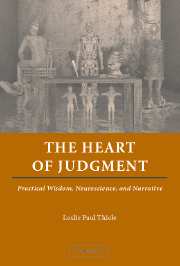4 - The Imperative of Affect
Published online by Cambridge University Press: 20 July 2009
Summary
Every faculty in one man is the measure by which he judges of the like faculty in another. I judge of your sight by my sight, of your ear by my ear, of your reason by my reason, of your resentment by my resentment, of your love by my love. I neither have, nor can have, any other way of judging about them.
Adam SmithNot everyone who understands his own mind understands his heart.
La RochefoucauldScooping Freud by more than a decade, Friedrich Nietzsche argued that the conscious mind is mostly a façade and that the vast majority of what really goes on in the brain remains unavailable to us. In The Gay Science, we read: “For the longest time, conscious thought was considered thought itself. Only now does the truth dawn on us that by far the greatest part of our spirit's activity remains unconscious and unfelt.” Unlike Freud, Nietzsche did not suggest that prodding the unconscious into speech would yield liberating knowledge. Rather, he insisted that making instinct articulate would result in its misrepresentation, if not corruption.
In grappling with the unconscious, Nietzsche asessed the role of innate knowledge and skills. But his primary focus was passion. Its exclusion from discussion in the last chapter marks a glaring omission. No account of practical judgment is complete without an adequate understanding of the role of emotion.
Though we hold our conscious thoughts in high esteem, Nietzsche observes, they really represent “the last link of a chain.”
Information
- Type
- Chapter
- Information
- The Heart of JudgmentPractical Wisdom, Neuroscience, and Narrative, pp. 163 - 200Publisher: Cambridge University PressPrint publication year: 2006
